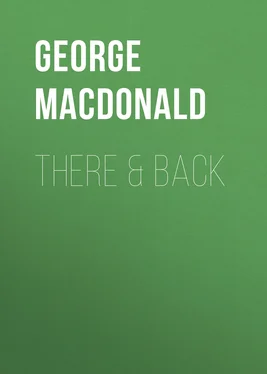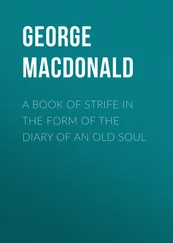George MacDonald - There & Back
Здесь есть возможность читать онлайн «George MacDonald - There & Back» — ознакомительный отрывок электронной книги совершенно бесплатно, а после прочтения отрывка купить полную версию. В некоторых случаях можно слушать аудио, скачать через торрент в формате fb2 и присутствует краткое содержание. Жанр: foreign_prose, foreign_religion, foreign_antique, на английском языке. Описание произведения, (предисловие) а так же отзывы посетителей доступны на портале библиотеки ЛибКат.
- Название:There & Back
- Автор:
- Жанр:
- Год:неизвестен
- ISBN:нет данных
- Рейтинг книги:4 / 5. Голосов: 1
-
Избранное:Добавить в избранное
- Отзывы:
-
Ваша оценка:
- 80
- 1
- 2
- 3
- 4
- 5
There & Back: краткое содержание, описание и аннотация
Предлагаем к чтению аннотацию, описание, краткое содержание или предисловие (зависит от того, что написал сам автор книги «There & Back»). Если вы не нашли необходимую информацию о книге — напишите в комментариях, мы постараемся отыскать её.
There & Back — читать онлайн ознакомительный отрывок
Ниже представлен текст книги, разбитый по страницам. Система сохранения места последней прочитанной страницы, позволяет с удобством читать онлайн бесплатно книгу «There & Back», без необходимости каждый раз заново искать на чём Вы остановились. Поставьте закладку, и сможете в любой момент перейти на страницу, на которой закончили чтение.
Интервал:
Закладка:
His friend’s mother lived in a little house of two floors, one of a long row lately built. The furniture was much too large, and it was difficult to move in the tiny drawing-room. It showed a feeble attempt at decoration, which made it look the poorer. Accustomed to his mother’s care of her things, Richard perceived a difference: these were much finer but neglected, and looked as if they felt it. At their evening meal, however, the tea was good, and the bread and butter were of the best.
The mother was a handsome middle-aged woman—not so old, Richard somehow imagined, as she looked. She was stout and florid, with plenty of black, rather coarse hair, and seemed to Richard to have the carriage of a lady, but not speech equal to her manners. She was polite to him, but not apparently interested in her son’s friend. Yet several times he found her gazing at him with an expression that puzzled him. He had, however, too clear a conscience to be troubled by any scrutiny. All the evening Arthur’s face wore the same look of depression, and Richard wondered what could be amiss. He learned afterward that the mother was so self-indulgent, and took so little care to make the money go as far as it could, that he had not merely to toil from morning to night at uncongenial labour, but could never have the least recreation, and was always too tired when he came home to understand any book he attempted to read. Richard learned also that he had no greatcoat, and went to the City in the winter with only a shabby comforter in addition to the clothes he had worn all the summer. But it was not Arthur who told him this.
The girl was a graceful little creature, with the same sad look her brother had, but not the same depression. She seemed more delicate, and less capable of labour; yet her hours were longer than his, and her confinement greater. Alice had to sit the whole day plying her needle, while Arthur was occasionally sent out to collect money. But her mistress was a kind-hearted woman, and not having a fashionable clientèle , had not yet become indifferent to the well-being of her work-women. She even paid a crippled girl a trifle for reading to them, stipulating only that she should read fast, for she found the rate of their working greatly influenced by the rate of the reading. Life, if harder, was therefore not quite so uninteresting to Alice as to Arthur, and that might be why she seemed to have more vitality. Like her mother she had a quantity of hair, as dark as hers, but finer; dark eyes, not without meaning; irregular but very pleasing and delicate features; and an unusually white rather than pale complexion, with a sort of sallow glow under the diaphanous skin. There was not a little piquancy in the expression of her countenance, and Richard felt it strangely attractive.
The youths found they had still tastes in common, although Arthur had neither time nor strength to follow them. Richard spoke of some book he had been reading. Arthur was interested, but Alice so much that Richard offered to lend it her: it was the first time she had heard a book spoken of in such a tone—one of suppressed feeling, almost veneration.
The mother did not join in their talk, and left them soon—her daughter said to go to church.
“She always goes by herself,” Alice added. “She sees we are too tired to go.”
They sat a long time with no light but that of the fire. Arthur seemed to gather courage, and confessed the hopeless monotony of his life. He complained of no privation, only of want of interest in his work.
“Do you like your work?” he asked Richard.
“Indeed I do!” Richard answered. “I would sooner handle an old book than a bunch of bank-notes!”
“I don’t doubt it,” returned Arthur. “To me your workshop seems a paradise.”
“Why don’t you take up the trade, then? Come to us and I will teach you. I do not think my father would object.”
“I learn nothing where I am!” continued Arthur.
“Our boat is not over-manned,” resumed Richard. “Say you will come, and I will speak to my father.”
“I wish I could! But how are we to live while I am learning?—No; I must grind away till—”
He stopped short, and gave a sigh.
“Till when, Arty?” asked his sister.
“Till death set me free,” he answered.
“You wouldn’t leave me behind, Arty!” said Alice; and rising, she put her arm round his neck.
“I wouldn’t if I could help it,” he replied.
“It’s a cowardly thing to want to die,” said Richard.
“I think so sometimes.”
“There’s your mother!”
“Yes,” responded Arthur, but without emotion.
“And how should I get on without you, Arty?” said his sister.
“Not very well, Ally. But it wouldn’t be for long. We should soon meet.”
“Who told you that?” said Richard almost rudely.
“Don’t you think we shall know each other afterwards?” asked Arthur, with an expression of weary rather than sad surprise.
“I would be a little surer of it before I talked so coolly of leaving a sister like that! I only wish I had one to care for!”
A faint flush rose on the pale face of the girl, and as swiftly faded.
“Do you think, then, that this life is only a dream?” she said, looking up at Richard with something in her great eyes that he did not understand.
“Anyhow,” he answered, “I would bear a good deal rather than run the risk of going so fast asleep as to stop dreaming it. A man can die any time,” he continued, “but he can’t dream when he pleases! I would wait! One can’t tell when things may take a turn! There are many chances on the cards!”
“That’s true,” replied Arthur; but plainly the very chances were a weariness to him.
“If Arthur had enough to eat, and time to read, and a little amusement, he would be as brave as you are, Mr. Tuke!” said Alice. “—But you can’t mean to say there will be no more of anything for us after this world! To think I should never see Arty again, would make me die before my time! I should be so miserable I would hardly care to keep him as long as I might. We must die some day, and what odds whether it be a few days sooner, or a few days later, if we’re never going to meet again?”
“The best way is not to think about it,” returned Richard. “Why should you? Look at the butterflies! They take what comes, and don’t grumble at their sunshine because there’s only one day of it.”
“But when there’s no sunshine that day?” suggested Alice.
“Well, when they lie crumpled in the rain, they’re none the worse that they didn’t think about it beforehand! We must make the best of what we have!”
“It’s not worth making the best of,” cried Alice indignantly, “if that’s all!”
My reader may well wonder at Richard: how could he be a lover of our best literature and talk as he did? or rather, talking as he did, how could he love it? But he had come to love it while yet under the influence of what his aunt taught him, poor as was her teaching. Then his heart and imagination were more in the ascendency. Now he had begun to admire the intellectual qualities of that literature more, and its imaginative less; for he had begun to think truth attainable through the forces of the brain, sole and supreme.
In matters of conduct, John Tuke and his wife were well agreed; in matters of opinion, they differed greatly. Jane went to church regularly, listened without interest, and accepted without question; had her husband gone, he would have listened with the interest of utter dissent. When Jane learned that her husband no longer “believed in the Bible,” she was seized with terror lest he should die without repentance and be lost. Thereupon followed fear for herself: was not an atheist a horribly wicked man?—and she could not feel that John was horribly wicked! She tried her hardest, but could not; and concluded therefore that his unbelief must be affecting her. She prayed him to say nothing against the Bible to Richard—at least before he arrived at years of discretion. This John promised; but subtle effluences are subtle influences.
Читать дальшеИнтервал:
Закладка:
Похожие книги на «There & Back»
Представляем Вашему вниманию похожие книги на «There & Back» списком для выбора. Мы отобрали схожую по названию и смыслу литературу в надежде предоставить читателям больше вариантов отыскать новые, интересные, ещё непрочитанные произведения.
Обсуждение, отзывы о книге «There & Back» и просто собственные мнения читателей. Оставьте ваши комментарии, напишите, что Вы думаете о произведении, его смысле или главных героях. Укажите что конкретно понравилось, а что нет, и почему Вы так считаете.












